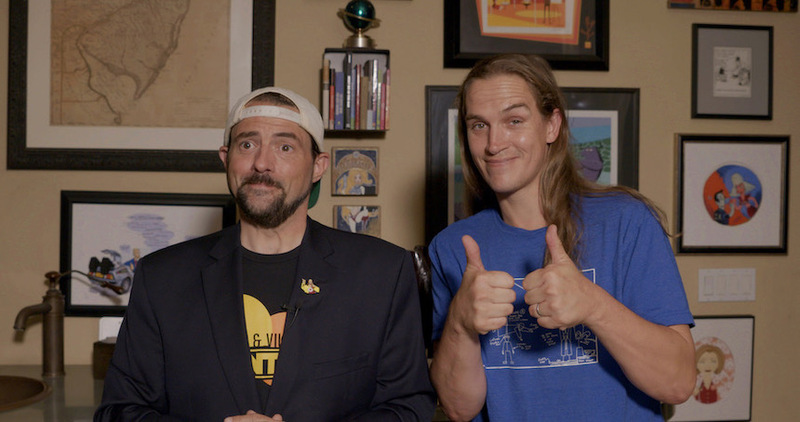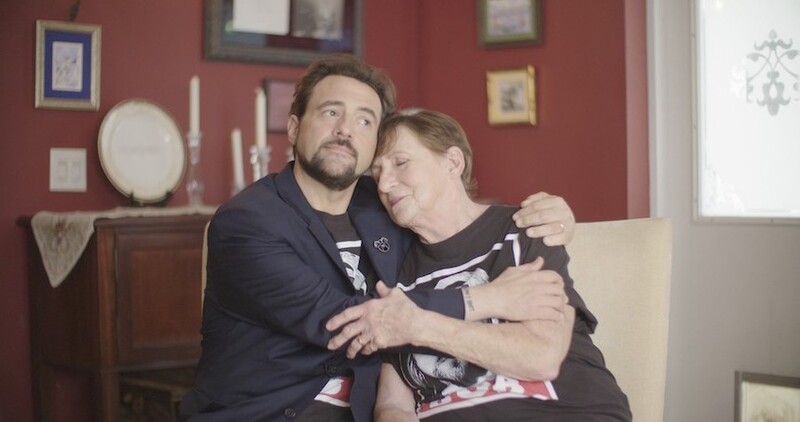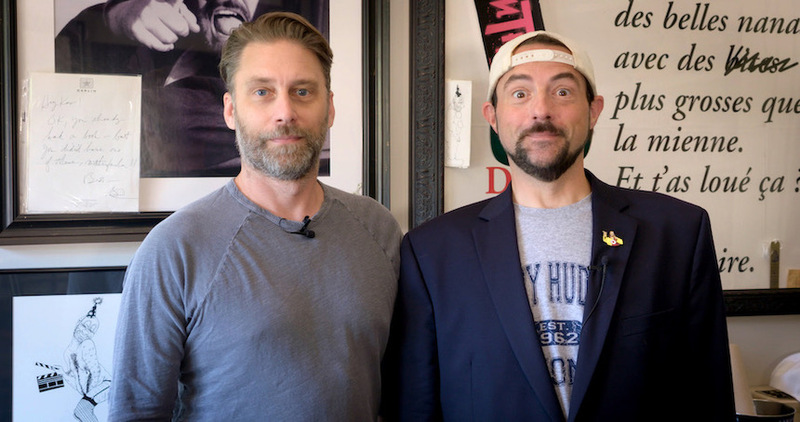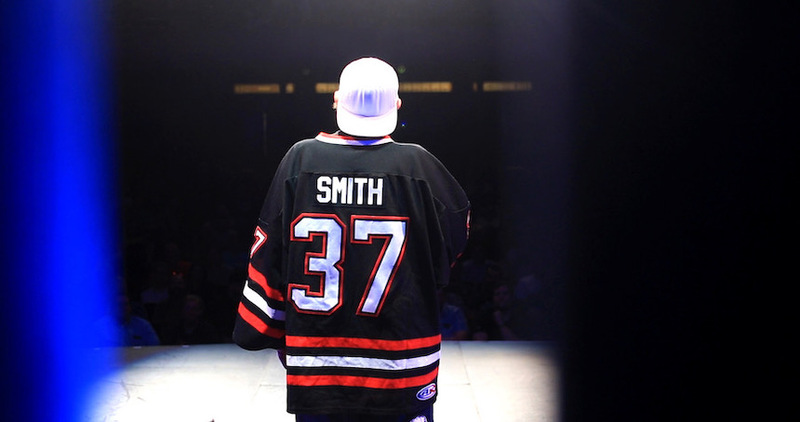SXSW 2021 Interview: CLERK Director Malcolm Ingram On Pop Icon Kevin Smith
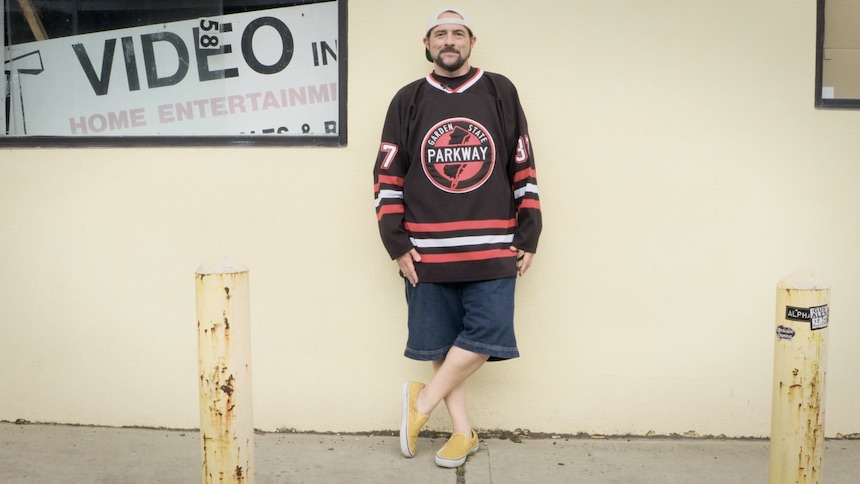
In 1992 a young man from New Jersey, US, traveled to Vancouver, Canada to study film and pursue his dream. Since he was little, his father instilled in him a love for movies. Then a particular film, Richard Linklater's Slacker, changed his life, because it convinced him that he could make his own films with few resources.
Kevin Smith's name was introduced to the world of cinema at the Sundance Film Festival in 1994. Withouth having completed his film studies, Smith wrote his first script, Clerks, which he filmed mainly in a New Jersey convenience store, where the newcomer filmmaker worked. With memorable and hilarious elements, Clerks wowed critics and was vital to the next generation: if Slacker influenced Smth, Clerks did the same for Jason Reitman (Thank You for Smoking, Juno), among others.
Amid the success of a new wave of American independent cinema, Smith and Scott Mosier – producer of all of his work, from Clerks to Zack and Miri Make a Porno – supported other filmmakers such as Canada's Malcolm Ingram.
Together they produced Ingram's debut feature Drawing Flies, co-directed by Matt Gissing. It's about a group of slackers who, withouth money or desire to get a job, take a journey through a wooded area, supposedly heading to the cabin of the protagonist's uncle. However, Donner (Jason Lee) hid his true intention from his friends: motivated by a strange vision, he decided to follow the trail of Sasquatch. In addition to Lee, other well-know faces appear in Drawing Flies: Jason Mewes, Renee Humphrey, Carmen Llywelyn, Joey Lauren Adams and Smith himself, in a cameo as Silent Bob. It's considered a sort of bridge between Mallrats and Chasing Amy; Smith saw qualities in Lee to play a more dramatic part.
Ingram made the jump to documentary film eventually. Smith and Mosier continued to support him and were involved in the production of Small Town Gay Bar, in which Ingram showcases the importance of various gay bars as safe spaces for the LGBT community in the state of Mississippi, where homophobia is terribly evident.
He recently directed Phantom of Winnipeg, a documentary that wonders why Brian De Palma's cult film Phantom of the Paradise initially failed everywhere except for Winnipeg? The COVID-19 pandemic sadly affected distribution plans and we have to keep waiting to watch it.
Malcolm Ingram's new documentary, presented at SXSW 2021, focuses on the life of his colleague and friend Kevin Smith. Clerk tackles the first 25 years of the independent film hero's career, from his debut to Jay and Silent Bob Reboot, which had already been a total celebration of the View Askewniverse (Smith, Mewes and company's shared universe). Smith nearly lost his life at age 47 following a heart attack in early 2018. Both Jay and Silent Bob Reboot and Clerk have a significant emotional charge, with a thoughtful Smith stopping to look back.
Clerk reveals a peculiar career, with personal works that were immediately acclaimed (Clerks, Chasing Amy), the controversial Dogma, box office flops (Mallrats, Jersey Girl, Zack and Miri Make a Porno), sequels/remakes (Clerks II, Jay and Silent Bob Reboot), a single work-for-hire project (Cop Out) and, of course, some strange and divisive turnarounds (Red State, Tusk, Yoga Hosers). Smith claims to have always looked for the $100 million dollars at the box office hit movie. Mallrats, his first studio work, in theory was going to achieve that level, however it fell $98 million short, Smith recalls provoking laughter as usual.
Every artist with such a long career has had difficult moments. Failures, seen in hindsight, are often important to achieve that longevity. Smith states in Clerk that had he been only a filmmaker, his career would have ended many years ago. He was a pioneer in creating a community with his fans through the Internet – he sold them, for example, posters thrown away after the Mallrats disappointment – he consolidated his figure little by little. Conversations, podcasts, comics (accompanied by a famous store), books, cartoons, toys, a street hockey league, and even marijuana joints... today, the name of Kevin Smith is immersed in pop culture. And, as a filmmaker, he can use any crazy idea – Tusk originated from a THC-fueled podcast – and try different methods, such as roadshows to bring the movies to his followers.
The documentary Clerk – which includes some Bruce Springsteen songs and interviews with family members, collaborators (Ben Affleck and Stan Lee included) and other personalities linked to Smith (Linklater mocking Smith steals the show!) – will be irresistible to this legion of fans. Before its world premiere at SXSW, I spoke with its director.
ScreenAnarchy: Tell us about your relationship with Kevin Smith.
Malcolm Ingram: I met Kevin in 1994, I was working for a magazine called Film Threat, he was on the festival circuit with Clerks. We met at the Toronto Film Festival, at a French restaurant after. We were in this very fancy restaurant and he ordered pancakes. We just got along right away, essentially we were just two guys that grew up overweight with a huge fondness for Prince and Talking Heads. We spoke the same language so we established a friendship.
With Clerks he got a deal to do two $40 thousand dollars movies. We ended up being one, I made a movie we called Drawing Flies that he produced. He's like a brother.
How did the documentary originate?
We were at Sundance, we watched a documentary on Richard Linklater (Richard Linklater: Dream Is Destiny), which is really great and wonderful. After that documentary I was like: “if we're making a documentary about you, I got to make it.” Ultimately the time came, we started making it around the 25th year of his career, which is always a good milestone.
I felt I could tell the story right but it was also complicated because I'm a queer, social-issue documentarian, so my integrity is something I hold very dear. I didn't want to just make a total jerk-off movie. I just wanted to do justice to the subject for the fans; ultimately I want this movie to reach as many people as possible but I know that the most important audience is the fans. They've invested a lot of their time, love and passion in Kevin, now it's generational, like mothers and fathers are introducing their daughters and sons to Kevin's movies. I just didn't want to disappoint those people.
How did you approach the protagonist's trajectory?
Essentially, it's a timeline piece. We could've filmed forever, that's the thing with a documentary, you have to feel comfortable to just walk away and be like “I've told the story I wanted to tell.” The culmination of his 25th year was making Jay and Silent Bob Reboot, I wanted to encapsulate that period. Hopefully in 25 years somebody makes another documentary about him and it'll be from Jay and Silent Bob Reboot on.
How do you remember American independent cinema from the 1990s?
The 1990s were incredible. I worked with the Toronto Film Festival beginning in 1990, I handled the movie posters. I met Quentin (Tarantino), he wanted all John Woo posters, I was a huge fan of John Woo and had a bunch of posters. So I established a friendship with Quentin before I even saw Reservoir Dogs. When I saw it, I was sitting in Quentin's row, it was Quentin, Harvey Keitel, Michael Madsen and me. People who'll see a movie like Reservoir Dogs now, you know it's great going in, but seeing Reservoir Dogs sight unseen in a theater and just being like “wow!” The 1990s were such a remarkable time for cinema that way, and then you have Paul Thomas Anderson, Doug Liman with Go.
I'm a 1970s baby who matured in the 1990s, so those are my two touchstones. The 1990s was the last time that people cared, there was a social responsibility. Grunge and all that stuff, Kurt Cobain, these were deeply thinking and feeling people, and very conscious of really important issues like women's rights and queer rights. 9/11 threw water on the world, it changed attitude. But the time before that, in film alone, was pretty remarkable and Kevin's work is such an important part of it. To actually have been witness to that was a privilege, an incredible experience.
Kevin has never achieved massive box office success, but he has a long career. What do you think of these kind of artists?
Kevin's career was a rollercoaster, it really was. Clerks was such a ridiculous success and Mallrats was such an abysmal failure. Then Chasing Amy was such a success, Jersey Girl was such a resounding failure.
Jersey Girl is a great film, the original cut before they had to take a bunch of J.Lo (Jennifer Lopez) out. Because the whole Bennifer thing, people just didn't like the concept of J.Lo and Ben Affleck together. She's a phenomenal actress. Basically that was a movie destroyed by shitty attitudes. As a friend, that's what people expect me to say but no, man, I know a shitty movie, I've made shitty movies. Hopefully people could see the original version of that film.
People hated Mallrats, they were angry at it. Mallrats didn't change, people's attitudes did. He was making a movie for Universal Studios, “this could be like Animal House, this is going to change everything,” and it bombed. But now Mallrats is probably the movie people see first of Kevin's work, it's given him so much. It's just so bizarre, Mallrats has always been such a fun, great movie, and it's interesting to be like “wow, man, there was a time when people hated this thing.”
Kevin became a pop culture icon. What do you think about this?
Kevin himself will say that he is the biggest Kevin Smith fan. When the Internet came on, it was like “oh my God, people want to talk about my movie? I would love to do that.” Kevin started the View Askew Board, where people go on and ask questions about his work. Kevin was happy to talk about it, he welcomed that kind of access. Before that, to talk with your fans was considered a low thing to do, everybody was above their fans. Kevin loves communicating with his fans from day one. I can't tell you the amount of times that I've been with him and people cried meeting him. It's incredible the profound effect that his work has had on people. It makes me feel really proud of him.
What are the essential Kevin Smith films?
If you're going to go into Kevin's world, you got to start with Clerks. I would just follow the timeline, you're not going to get bored, you might get angry. His work is so different, he has created his world but he's covered relationships (even same-sex relationships), sexuality, religion, politics. And he's taken some very interesting u-turns like Red State, who would've thought? I love that movie, it's fantastic. Tusk is a fucking crazy movie, but I think it's great and a lot of people too. So follow the timeline, stick around, you won't be bored.
How did you get the news of his heart attack?
It was scary. I was supposed to fly to LA the day after the heart attack, but I got a text from Kevin's business partner. By the time I woke up, it was all over, he was fine. Every friend of Kevin checked Twitter, even before reaching out to Kevin because you knew that he would reach out that way, and he did: from his hospital bed, Kevin sent a tweet out. We have part of it in the movie. It was just like, “that's Kevin.”
Kevin from that moment took his health very seriously, and it's very much credit to his daughter Harley Quinn Smith, who basically forced him into a vegan diet. You just have to see him, he looks so healthy, so good. He works hard but he did it. I'm so proud of him, that heart attack changed his life.
What will be the legacy of Kevin Smith?
His work is his legacy. The great thing about Kevin is that his voice comes out so much in his work. He's left a varied, interesting body of work that very much reflects the times, the attitudes. A lot of people have been very moved by Kevin.
In this industry, it's hard to stick around that long. Some people come and go, some people come back. Kevin Smith has endured.
A version in Spanish of this interview was also published at Cinema Inferno



